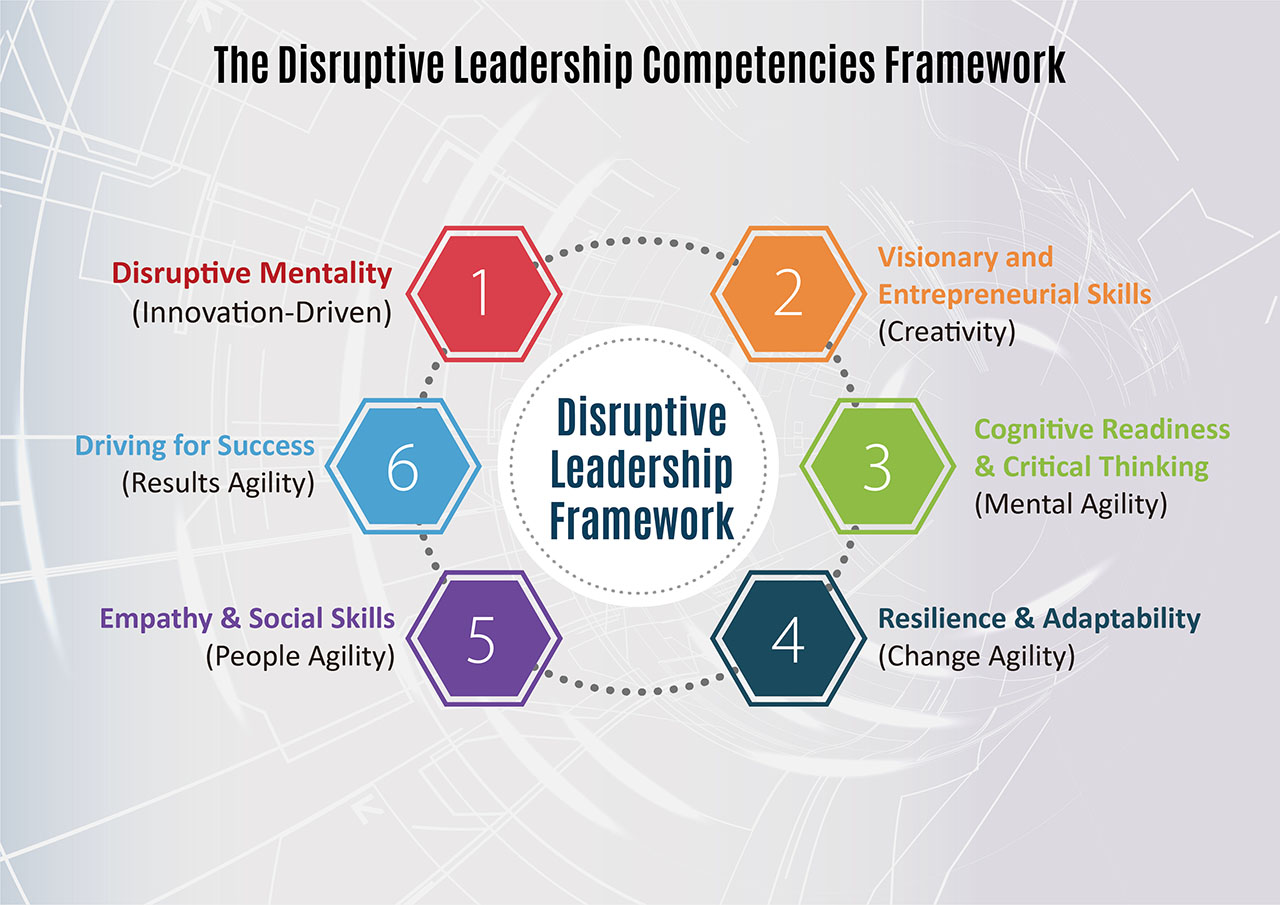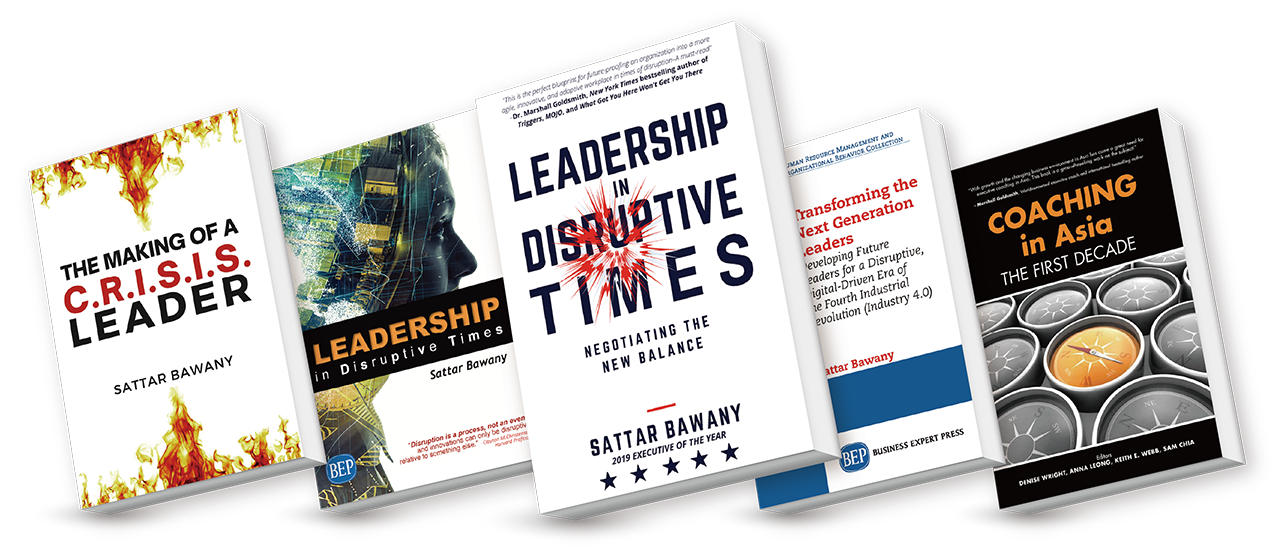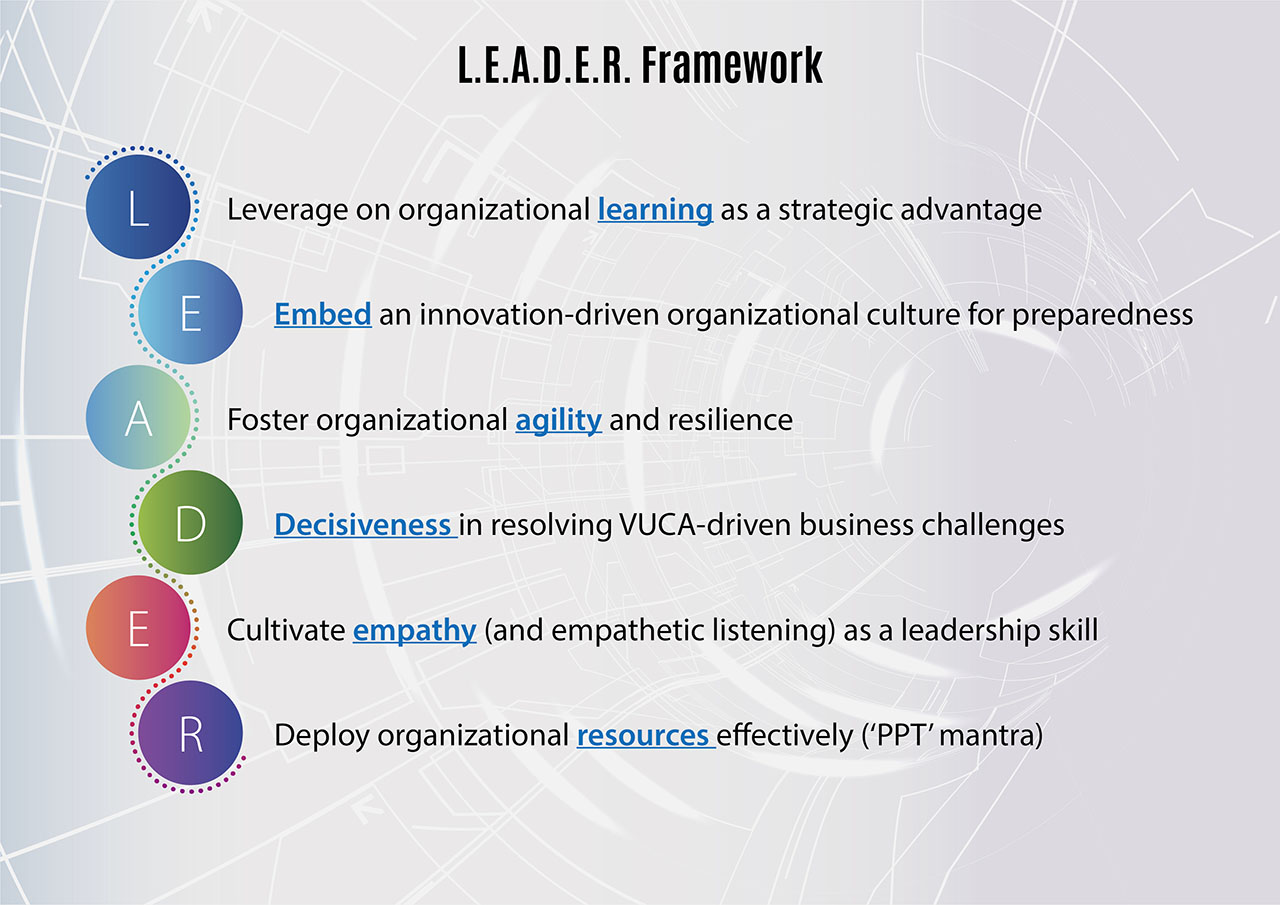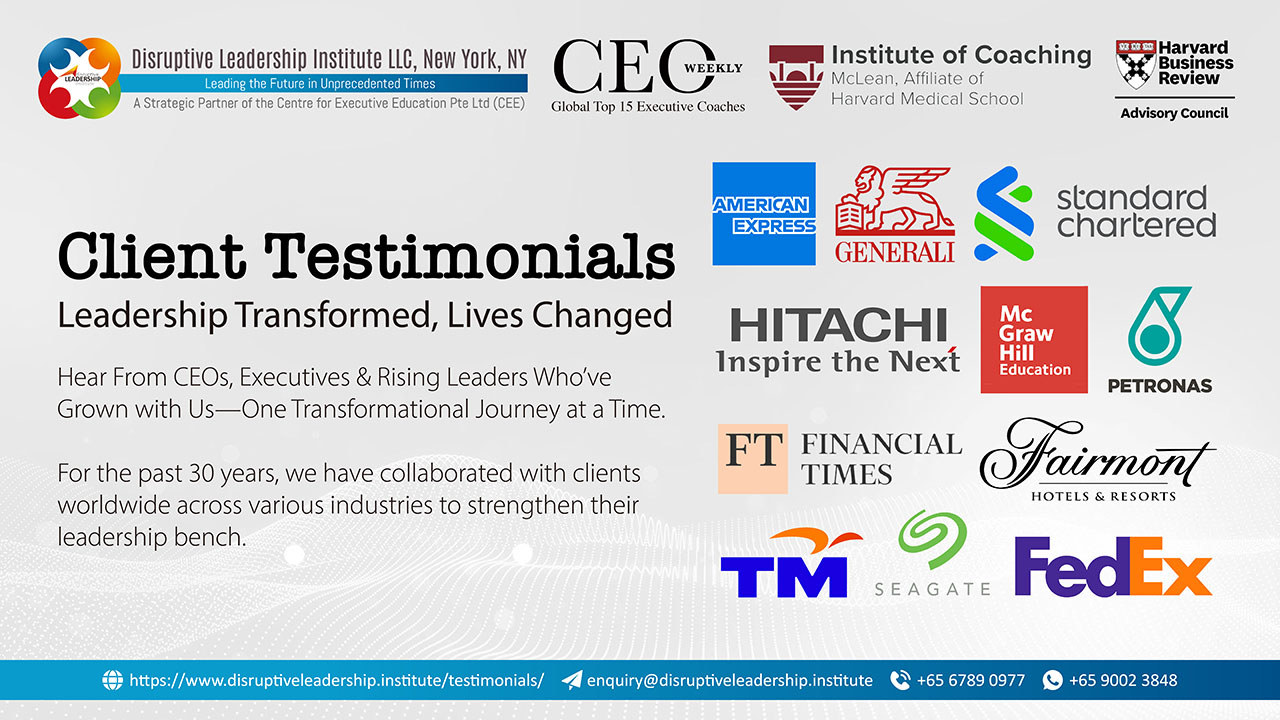In today’s volatile, uncertain, complex, and ambiguous (VUCA) world, organizations face unprecedented disruption—driven by rapid technological advancements, shifting customer expectations, socio-political shifts, and global crises. Traditional leadership approaches are no longer sufficient. To thrive, leaders must embrace and demonstrate successfully the Disruptive Leadership Competencies—a mindset and skillset that goes beyond adaptation to actively shaping the future (see Figure 1).
Disruptive Leadership Masterclass
“Disruptive leadership competencies include cognitive readiness, disruptive mental agility, and emotional resilience—leaders must be comfortable with uncertainty, have self-awareness and self-confidence to make speedy but thoughtful decisions in ambiguity, and communicate consistently, clearly and openly, even when there is nothing to communicate.”
Disruptive Leadership Blueprint: Navigating Complexity with Confidence
Overview: 2-Day Masterclass on Disruptive Leadership
Figure 1: The Disruptive Leadership Competencies Framework
This 2-Day Masterclass provides a transformative learning experience that equips senior executives, policymakers, and high-potential leaders with the insights, tools, and frameworks necessary to lead with agility, resilience, and impact in disruptive times.
Figure 2: The Future-Ready Leadership Book Series
Through a dynamic blend of case studies, interactive simulations, group discussions, and practical frameworks drawn from the Future-Ready Leadership Book Series (see Figure 2), participants will:
- Understand the principles of disruptive leadership and why they matter in navigating uncertainty.
- Develop cognitive readiness and mental agility to make sound decisions under ambiguity.
- Explore strategies for leading organizational transformation in the face of disruption by leveraging the proven “L.E.A.D.E.R.” Framework (see Figure 3).
- Strengthen emotional resilience to inspire trust and confidence amidst crises.
- Learn how to leverage innovation, digitalization, and human-centered leadership to create sustainable value.
- Build a personal leadership roadmap for thriving in the future workplace.
Figure 3: The “L.E.A.D.E.R.” Framework
By the conclusion of the program, participants will not only have sharpened their leadership toolkit but will also walk away with the confidence to lead their teams and organizations toward growth, resilience, and relevance—no matter how disruptive the future becomes.
Business Case for Attending the Disruptive Leadership Masterclass

Context and Rationale
The pace of disruption is accelerating—driven by digital transformation, global crises, market volatility, and shifting workforce dynamics. Traditional leadership models, built on stability and incremental change, are inadequate for the complexities of today’s environment. Organizations that fail to embrace disruptive leadership risk being outpaced by more agile competitors, losing talent engagement, and missing opportunities for innovation and growth.
The Disruptive Leadership Masterclass is designed to bridge this leadership gap. Grounded in the research and frameworks of the Future-Ready Leadership Book Series, this program equips leaders with the competencies needed to navigate ambiguity, build resilience, and create breakthrough value in disruptive times.
Key Benefits and ROI
- Future-Ready Leadership Capabilities
- Participants gain practical tools to lead with agility, resilience, and clarity in volatile environments.
- They learn how to anticipate disruption, pivot strategies, and foster innovation across the organization.
- Stronger Organizational Performance
- By mastering disruptive leadership, executives can better align teams, accelerate execution, and drive sustainable growth.
- Organizations benefit from leaders who can seize opportunities amidst crises rather than being paralyzed by them.
- Workforce Engagement and Retention
- Leaders develop emotional intelligence and crisis-leadership skills to inspire confidence and maintain employee morale.
- This enhances organizational culture, reduces turnover, and strengthens employer branding.
- Strategic Advantage in the Digital Age
- The program helps leaders understand how to harness emerging technologies and disruptive business models.
- Organizations can leverage these insights to remain competitive and relevant in the future economy.
- Personal and Professional Growth
- Participants build a personal leadership roadmap, aligning career aspirations with organizational needs.
- They leave with actionable strategies that can be applied immediately in their leadership roles.
Why Now
The past few years have underscored that disruption is no longer episodic—it is constant. Whether navigating a global pandemic, digital transformation, geopolitical uncertainty, or industry-wide disruption, organizations need leaders who can act decisively under ambiguity, communicate with clarity, and innovate for the future.
Investing in the Disruptive Leadership Masterclass is not a discretionary training expense—it is a strategic imperative. It ensures that your leadership team is equipped not just to survive disruption but to capitalize on it as a catalyst for transformation and growth.
Who Should Attend

This program is designed for:
- C-Suite Executives, Board Members, and Senior Leaders
- Strategy, Risk, and Transformation Officers
- HR, L&D, and OD Professionals
- High-Potential Leaders preparing for next-level roles
- Managers who aim to sharpen critical thinking and improve judgment
- Executive Coaches and Masterclass Facilitators
How You Will Benefit

By participating in this intensive 2-day learning experience, you will gain the knowledge, insights, and practical tools needed to thrive as a leader in today’s disruptive business landscape.
- Develop Future-Ready Leadership Competencies
- Build cognitive readiness, mental agility, and resilience to lead confidently in uncertain and rapidly changing environments.
- Master the Principles of Disruptive Leadership
- Learn how to anticipate disruption, challenge status quo thinking, and transform crises into opportunities for growth.
- Enhance Decision-Making Under Ambiguity
- Strengthen your ability to make timely, sound, and ethical decisions even when information is incomplete or contradictory.
- Lead Organizational Transformation
- Gain proven strategies to align people, processes, and culture to thrive in disruptive times.
- Boost Your Emotional Intelligence and Crisis Leadership Skills
- Inspire trust, maintain engagement, and effectively communicate with diverse stakeholders during times of change.
- Leverage Innovation and Digital Disruption
- Understand how emerging technologies and new business models can be harnessed to create sustainable competitive advantage.
- Learn from Real-World Case Studies and Simulations
- Apply disruptive leadership frameworks to real challenges through case studies, role-plays, and group exercises.
- Build Your Personal Leadership Roadmap
- Develop a customized action plan that aligns your leadership growth with organizational needs and future opportunities.
- Expand Your Professional Network
- Engage with peers across industries, sharing insights, challenges, and solutions to disruption.
✅ Ultimately, this Masterclass ensures you leave not just with ideas, but with actionable strategies and the confidence to lead your team and organization through disruption and into the future.
The Learning Model

This Masterclass adopts DLI’s High-Impact Experiential Learning Model, blending:
- Master Coach-led sessions for expert insights and frameworks.
- Interactive group work to apply concepts in real time.
- Role-play and simulation exercises to build skill confidence.
- Case study analysis to learn from real-world best practices and failures.
- Action planning to ensure practical application post-training.
Case Study Methodology

The Masterclass adopts an experiential learning approach, with the case study methodology at its core. This ensures participants move beyond theoretical knowledge to the practical application of disruptive leadership frameworks in real-world contexts.
- Purpose of Case Studies
- To immerse participants in realistic leadership challenges drawn from diverse industries and geographies.
- To enable leaders to test and refine their decision-making, strategic thinking, and emotional resilience under disruption.
- To foster peer-to-peer learning, encouraging cross-industry perspectives and collaborative problem-solving.
- Sources of Cases
- Published Case Studies: Adapted from global organizations that have navigated disruption successfully or failed to respond adequately.
- Original Research & Insights: Drawn from Prof. Sattar Bawany’s Future-Ready Leadership Book Series and the Disruptive Leadership Institute’s research.
- Participant-Derived Cases: Real-time challenges shared by participants, transformed into live case scenarios for group analysis.
- Methodology in Practice
- Pre-Reading & Framing: Participants receive short case summaries before sessions to familiarize themselves with context and dilemmas.
- Small-Group Discussions: Teams analyze the case, debate leadership responses, and apply disruptive leadership frameworks.
- Facilitator-Led Debriefs: Prof. Sattar Bawany leads structured reflections, linking case insights to leadership competencies such as cognitive readiness, disruptive agility, and crisis resilience.
- Role-Play & Simulation: Selected cases are brought to life through scenario role-plays, enabling leaders to practice communication, influence, and decision-making under pressure.
- Actionable Takeaways: Each case ends with participants mapping lessons to their own organizational realities, ensuring immediate relevance and application.
- Outcomes of Case Study Learning
- Enhanced ability to analyze complex, ambiguous situations.
- Improved strategic and critical thinking under conditions of disruption.
- Strengthened collaborative leadership skills through group problem-solving.
- A toolkit of tested approaches to apply in their roles post-masterclass.
✅ The case study methodology ensures this Masterclass is not a lecture but a leadership lab—a safe space to experiment, learn, and prepare for real-world disruption.
Program Agenda

Day 1: Understanding & Building the Foundations of Disruptive Leadership
Registration & Networking Breakfast
Opening & Framing the Masterclass
- Welcome remarks and objectives
- Framing disruption: VUCA vs. BANI world
- Participant introductions and expectations
Module 1 | The Case for Disruptive Leadership
- Why traditional leadership models are failing
- Characteristics of disruptive times
- Prof. Bawany’s Future-Ready Leadership frameworks
Activity: Interactive Poll & Group Dialogue – What disruption means in your context
Case Study: “Kodak vs. Netflix” – Lessons on adaptation and missed opportunities
Morning Break
Module 2 | Core Competencies of a Disruptive Leader
- Cognitive readiness and disruptive mental agility
- Emotional resilience in crisis situations
- Leading with values and authenticity in uncertain times
Activity: Leadership Agility Assessment (individual diagnostic tool)
Simulation: Crisis in the Boardroom – making decisions under pressure
Networking Lunch
Module 3 | Leading People Through Disruption
- Engaging and aligning stakeholders during transformation
- Building trust and psychological safety
- Communicating with clarity during ambiguity
Activity: Role-Play – Leader as Communicator in a Crisis Scenario
Case Study: “AirAsia & Crisis Leadership during COVID-19”
Afternoon Break
Module 4 | Innovation, Agility, and the Digital Imperative
- Harnessing disruption as a driver for innovation
- Leveraging digital transformation and emerging technologies
- Encouraging experimentation and intrapreneurship
Activity: Innovation Lab – Designing disruptive solutions in cross-functional teams
Day 1 Reflections & Leadership Journal
- Key insights sharing
- Reflection exercise: How disruption affects my leadership style
Day 2: Applying Disruptive Leadership in Action
Networking Breakfast
Recap of Day 1 & Preview of Day 2
Module 5 | Driving Organizational Transformation
- Aligning strategy, culture, and structure for disruption readiness
- Building resilient teams and agile organizations
- Overcoming resistance to change
Case Study: “Microsoft’s Transformation under Satya Nadella”
Activity: Group Exercise – Mapping organizational barriers to disruption
Morning Break
Module 6 | Leading in Crises and Complexity
- Crisis leadership vs. everyday leadership
- Rapid decision-making frameworks in uncertainty
- Maintaining balance between stability and agility
Simulation: The Sudden Disruption Scenario – teams respond to a live unfolding crisis
Debrief: Emotional resilience and decision trade-offs
Networking Lunch
Module 7 | Building the Future-Ready Leader
- The Future-Ready Leadership competencies model (from Prof. Bawany’s research)
- Anticipating the future workplace and workforce disruptions
- Leading multigenerational and hybrid teams
Activity: Peer Coaching Triads – Leadership challenges and solutions
Case Study: “Grab & Gojek – Competing in the Digital Economy”
Afternoon Break
Module 8 | Personal Leadership Roadmap for Disruptive Times
- Integrating learnings into a personal action plan
- Setting commitments for organizational application
- Peer feedback and facilitator coaching
Activity: Individual Reflection & Action Planning Workshop
Closing Session & Certificate Presentation
- Sharing key takeaways
- Executive Dialogue/Fireside Chat with Prof. Satar Bawany
- Presentation of certificates
Client Testimonials
Our distinguished team, each possessing a proven track record of enhancing leadership performance and fostering enduring organizational excellence, has earned widespread recognition for its transformative impact on leaders across diverse industries. Our clients consistently express appreciation for our panel of coaches’ insightful coaching style, deep expertise in leadership development, and unwavering commitment to empowering executives to lead with authenticity, resilience, and strategic clarity.
Many of our clients’ testimonials highlight our panel of facilitators, faculty members, and coaches’ ability to rapidly build trust and rapport with the participants and their coachees, creating a safe and reflective environment for personal growth. Executives from multinational corporations, government agencies, and non-profit organizations have described our facilitators’ delivery and coaching styles and approaches as “life-changing,” noting that they not only enhanced their leadership capabilities but also strengthened their emotional intelligence and decision-making skills. A common sentiment shared by clients is that our facilitators and coaches possess a rare ability to ask the right questions—those that provoke deep introspection and inspire meaningful change.
The original Testimonials can be found here.
Certificate Of Achievement Award Upon Completion
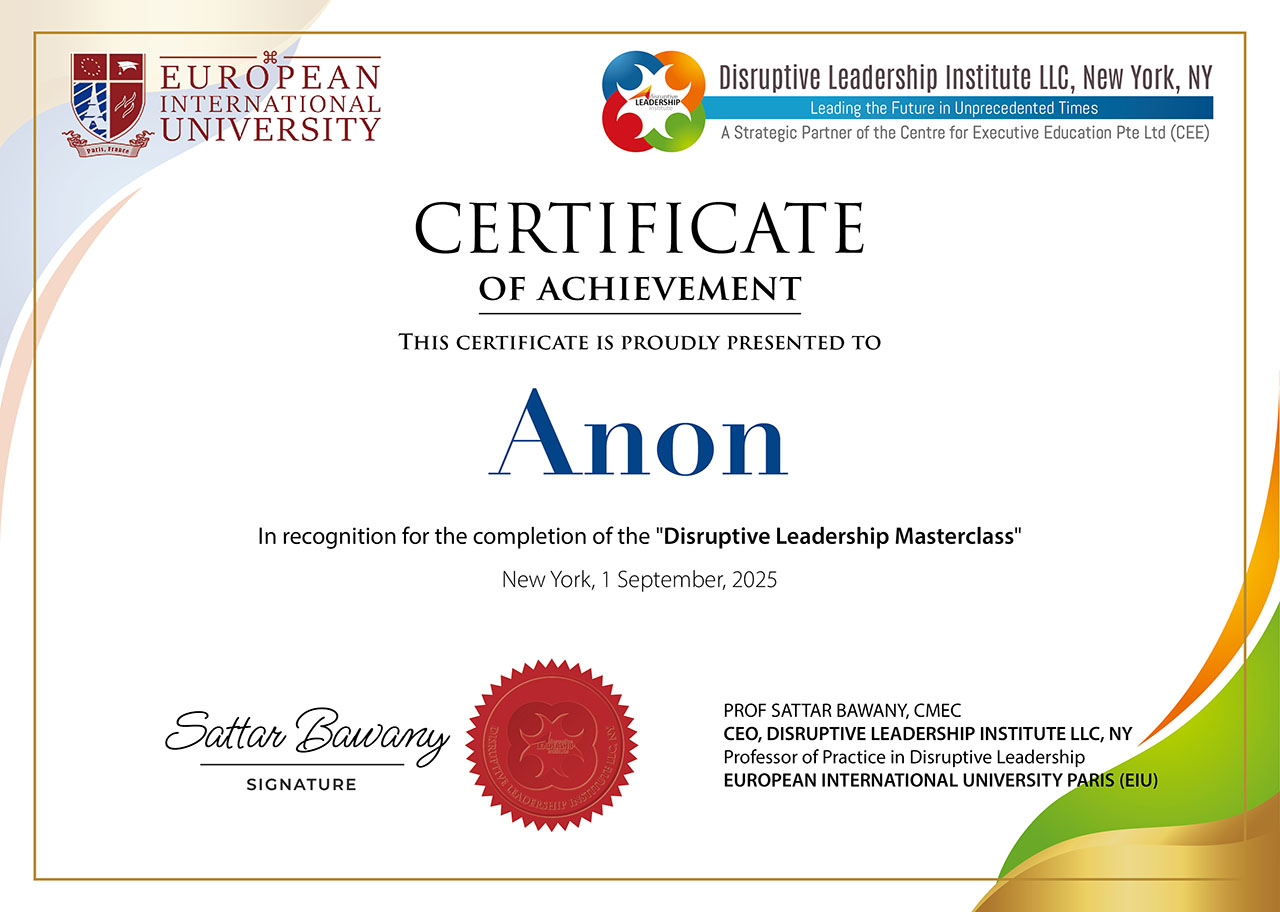
Contact

Let us be part of your success story. Contact us and see how our leadership development consultants and executive coaches can transform your leadership team from ‘good to great’!
For further information, please contact us via email or send us a WhatsApp message at +65 9002 3848.


